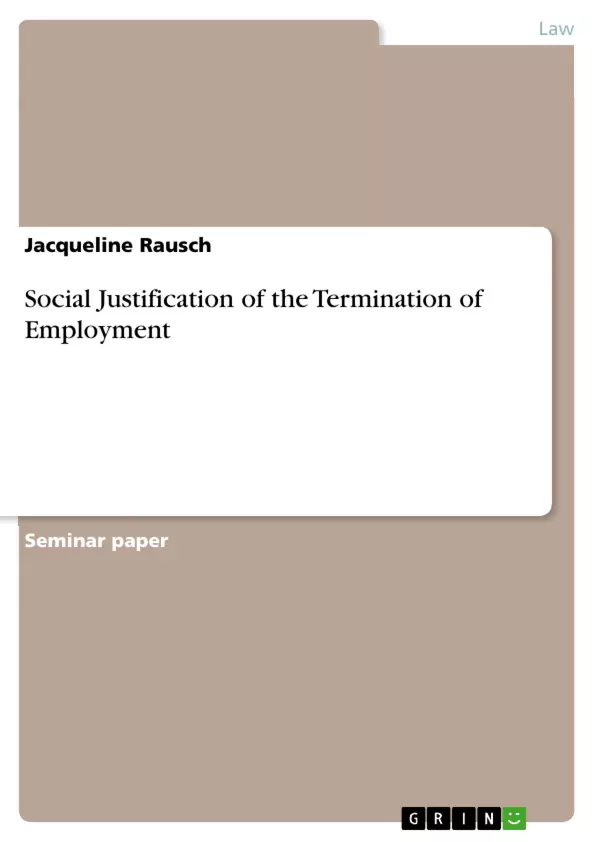In Germany the relationship between employer and employee is characterised as a continuing obligation and therefore, besides a few exceptions, it needs an official termination of the working contract.
This assignment deals with the one-sided termination of a working contract by the employer and in particular with the so-called "ordinary cancellation".
One aspect of the ordinary cancellation of a working contract is the "German Protection against Dismissal Act" (KSchG). On the one side the KSchG has to ensure individual interests of the employer as well as the employee and on the other side to enhance the moral commitment on both sides.
General prerequisites for the application of the KSchG can be found in section 2. The employment law provides three different scenarios of an ordinary termination.
Firstly, the termination for reasons related to the person itself (see section 3), secondly the termination related to the conduct of a person (see section 4) and lastly the termination for urgent operational reasons (see section 5).
Besides the general protection against dismissal the law also provides a special protection for a few groups of employees, which is described in section 6, covering also the extraordinary termination.
Inhaltsverzeichnis (Table of Contents)
- Introduction
- General Prerequisites for Application of the German Protection against Dismissal Act
- Requirements of Termination for Reasons Related to the Person
- Requirements of Termination for Reasons Related to the Conduct of an Employee
- Requirements of Termination for Urgent Operational Reasons
- Special Protection against Dismissal
Zielsetzung und Themenschwerpunkte (Objectives and Key Themes)
This assignment focuses on the one-sided termination of a working contract by the employer in Germany, particularly examining the "ordinary cancellation" process. The main objective is to explore the legal framework governing employee dismissal, specifically the German Protection against Dismissal Act (KSchG), with emphasis on its application and the different scenarios for termination.
- Legal framework for terminating employment contracts in Germany
- Application of the German Protection against Dismissal Act (KSchG)
- Different types of termination scenarios
- Prerequisites for applying the KSchG
- Specific conditions for different termination reasons
Zusammenfassung der Kapitel (Chapter Summaries)
- Introduction: This section provides an overview of the German employment relationship, highlighting the legal requirement for official termination of working contracts. It introduces the concept of "ordinary cancellation" and its connection to the KSchG.
- General Prerequisites for Application of the German Protection against Dismissal Act: This chapter discusses the two main prerequisites for applying the KSchG, which are the minimum number of employees and the duration of the employment. It delves into the specific criteria for each prerequisite and outlines the calculation methods for determining the duration of employment.
- Requirements of Termination for Reasons Related to the Person: This section examines the termination process when the reason for dismissal is linked to the employee's personal attributes or capabilities, hindering them from fulfilling the contract. It outlines the three key requirements for justifiable cancellation in this scenario: negative prognosis, ultima ratio principle, and comprehensive balancing of interests.
- Requirements of Termination for Reasons Related to the Conduct of an Employee: This chapter explores the termination process when the reason for dismissal is based on the employee's misconduct or failure to meet contract obligations. It differentiates between various reasons for termination related to the employee's conduct, including performance, disruption of trust, and other breaches of contract.
Schlüsselwörter (Keywords)
This text primarily focuses on the legal aspects of employee dismissal in Germany. Key terms include the German Protection against Dismissal Act (KSchG), ordinary cancellation, termination for reasons related to the person, termination for reasons related to the conduct of an employee, and the requirement of "ultima ratio" (last resort) in the context of dismissals.
- Citation du texte
- Jacqueline Rausch (Auteur), 2014, Social Justification of the Termination of Employment, Munich, GRIN Verlag, https://www.grin.com/document/300047



